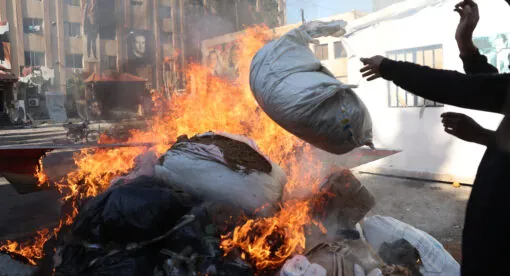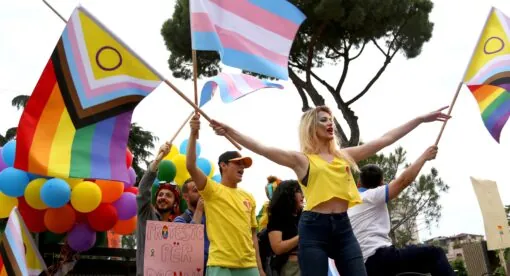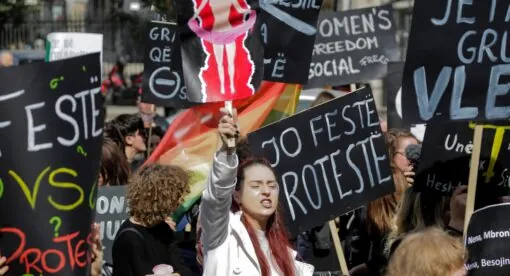This article was drafted in concert with the Nigerian Civil Society Working Group hosted by the Priority Sustainable Counterterrorism portfolio at the New Lines Institute. The group consists of over 20 Nigerian civil society organizations working to address topics such as justice, youth, women, capacity-building, peace-building and the prevention of violent extremism across Nigeria, including in the northern region.
This working group is part of the Localization Project working to bring issues and recommendations from the local level to practitioners and policymakers at the national and international levels to support both bottom-up and top-down solutions to issues of insecurity. Numerous opportunities exist to strengthen connections and institutions, implement changes and improve policies to make communities less susceptible to engagement with terrorist groups and to actively obstruct pathways to engaging in violent extremism and/or political violence.
Nigeria, warmly referred to as “Big Brother” by many people across Africa, teeters on the edge of chaos. Discontent among Nigerians has reached a boiling point, and their voices of frustration are growing louder. The protests that took place across the country from Aug. 1-10 were a cry for help, a call to action, and a demand for change.
Those protests, organized under the hashtag #EndBadGovernance, have largely subsided, but unrest continues to smolder in a handful of states with frangible stability and an especially aggrieved citizenry who have a distrust of security and governing entities. Their continued dissatisfaction may well reemerge as further protests or manifest more broadly in unrest and conflict that could turn violent. However, it is more likely that the protest movement will slowly dissipate and that the government response will not fully address their concerns.
This scenario would further perpetuate the tendency among nations in West and Central Africa of responding quickly and forcefully to suppress instability rather than addressing its roots. Nigerian civil society groups who work to make positive impact and advocate for solutions and ways to strengthen Nigerian society – from increasing access to justice, improving representation of youth and women, capacity building, human rights, and preventing and countering violent extremism – have pointed out numerous opportunities for policy reform and sustainable peacebuilding. Key points and recommendations range in topic but all address citizens needs and concerns and support a peaceful and prosperous future. Governments across Africa should work with civil society and also prioritize transparency that is matched with follow through, ensuring an open and inclusive civic space to mitigate future mass protests in Nigeria.
Grievances sparking the recent Nigerian protests included economic hardships defined by an inflation rate that hit a 28-year high in June, corruption, and ineffective governance. Rising food costs, the loss of fuel subsidies and the sense that the government does not have their best interests at heart prompted thousands to take to the streets and city centers across Nigeria. Other issues, including insecurity, corruption, unemployment, and the decay of infrastructure and public services, have become hallmarks of Nigeria’s governance. Nigerians by and large feel that the country’s leadership has failed to address these pressing concerns, compelling them to protest. Positive intent and clear messaging by the government, followed by action, can address Nigerians’ concerns and prevent and mitigate violence.
Insecurity has been a point of great concern. Amnesty International reported that 22 civilians died in clashes with security forces while other sources claim as many as 40 were killed over the course of the protests. Now that the protests have abated, it is of the utmost importance for Nigerian law enforcement to prioritize professionalism and to refrain from inciting further violence with forceful crackdowns on protesters, civil society organizations, or trade unions. Any further harassment and intimidation at the hands of law enforcement or security forces will undoubtedly result in further grievances, a less democratic society and government, and could potentially result in outright violence or support for violent or stronger action. If security forces refrain from harassment or intimidation, and foster trusting and positive relationships with the people– existing and future concerns and issues can be better addressed. The energy expressed by protest could then be channeled toward positive growth and change.
Security agencies, including the police and military, were on high alert weeks before the early August protests even started – with joint strategy meetings and public calls for citizens to refrain from protesting in the name of public safety and to prevent a breakdown of law and order. Nigerian civil society leaders noted that security and government agencies were trying to stay ahead of the planned protests, saying police, for example, “urged all groups planning to participate in the protest to submit their details to the commissioners of police in their respective states.” However, they also shared concerns that the protests would lead to violence and deepen rifts in northern parts of Nigeria especially.
In the wake of the protests, policymakers have the opportunity to take action to heal some of these rifts (including the grievances and mistrust between citizens and security agencies and government) across the country. To mitigate the possibility of future violence and to prevent simmering grievances from manifesting as violent extremism and engagement with terrorist groups, Nigerian policymakers must move with as much enthusiasm to heal open wounds and to build honest and positive relationships as they did when preparing to respond to the nationwide protests. The million-man-march planned for Aug. 10 may be over, and protest numbers arguably never reached those levels that day, but those million citizens and their grievances have not gone away.
Protests Are a Call for Protection
While this protest movement, fueled by the combination of citizen unrest, distrust of government and the economic and security situations, has the potential to grow and experience more violence, there is also the potential for positive impacts. How the government chooses to react to these protests will greatly affect any future iterations. Continued human rights abuses and security force crackdowns could determine how the protest movement evolves.
These protests are a call for protection, a plea to be heard, and a ring of hope and desire for a livable future. Some recommendations from international organizations and analysts have treated Nigeria as a rising and prosperous star. And while that may be true, each town, state, and region is tackling unique issues. Nigeria has its greater objectives as a nation, but the protests have shown that some Nigerian communities and states feel the effects of some policy decisions more strongly and that some states are not as easily stabilized.
This disparity is especially evident in northern Nigeria, where many communities are active conflict zones and experience high rates of banditry. Some states would benefit from capacity-building or sustainable agricultural practices, but ongoing conflicts prevent them from being able to carry out those activities, forcing families to flee from the violence. In locales where movement and livelihood are greatly restricted by violence, government policies and focus should first address physical stability and solving the conflict’s root causes. In other states, there is stability, but justice and legal reforms are necessary. States must progress from their unique realities to achieve a more stable, peaceful, and prosperous future.
Rising Food Costs and Currency Devaluation
Nigerian citizens are feeling the daily pressure of growing food costs and the devaluation of the naira. Once Africa’s largest and strongest economy, Nigeria has fallen to fourth, as measured by gross domestic product, behind South Africa, Egypt, and Algeria due to currency devaluations. According to the World Bank, 87 million Nigerians live below the poverty line, with many struggling to afford necessities like food and shelter. The country’s economy has been in a state of stagnation, with no clear plan to stimulate growth or create jobs. Nigerian policymakers are overdue to share a short- to mid-term plan to stabilize the economy and address staggering inflation.
As the Institute for Security Studies pointed out, the economic reforms that President Bola Tinubu implemented shortly after taking office were ones advocated for by international institutions and analysts. While policy reforms can be informed or supported by any expert, to be effective, they should be assessed and implemented with consideration of the status and perceived trajectory and acceptance of a country and citizens, both as a whole and in particular regions. Policies and programs do not reach their potential if they are not implemented with care and consideration for each state and community.
Daily Impact of Inflation and Instability
The mass participation in the days of protest reflects the impact that security and economic hardships have placed on people. Other daily pressures include increased rents, the high cost of transportation, the unavailability and expense of fuel, and increasing tuition and school fees that have forced children to leave school.
As the Nigerian Civil Society Working Group shared, “broken homes and marriages emerge from lack and extreme poverty – conditions that exacerbate gender-based violence in homes and lead to rising numbers of women and children on the streets begging for help.” The protests served as a wake-up call for Nigeria’s leadership. It is a reminder that its citizens will no longer tolerate the status quo. The demonstrations were a not only a demand for change, accountability, and transparency, but also an opportunity for a demonstration of good faith.
Over the course of the country’s protests, Tinubu passed a law more than doubling the minimum wage for public sector workers. The question becomes whether the Nigerian government is willing to pursue other policy reforms outside of ones designed to placate more mass protests. If policy reforms are only passed in response to mass protests, this may in turn encourage more mass protests, especially if citizens and civil society feel that they are the only means by which they can force policy reforms to be enacted.
Instability Meets Insecurity
Instability, coupled with Nigeria’s history of corruption, has led the nation to this point. Nigeria ranked 145 out of 180 countries in the Transparency International’s Corruption Perceptions 2023 Index. Insecurity, driven by terrorism, kidnapping, and banditry, have exacerbated Nigeria’s economic pains, contributing to rising food costs and instability across the country. According to Nigerian civil society groups, the decay of infrastructure and public services has also taken its toll. For many, the “roads are in disrepair, healthcare is inadequate, and education is underfunded.”
The government’s failure to adequately invest in these critical areas has left citizens feeling neglected and abandoned. Likewise, they have been left feeling vulnerable and unprotected by an inadequate government response to security challenges. While it might sound as if citizens are demanding unrealistic or overnight solutions to multifaceted and deeply rooted issues, they are merely asking to be heard, to be protected and to be shown that progress is being made. These achievable goals should start with efforts by local and state government to connect with civil society more intentionally and consistently.
If the Nigerian government does not make public moves to address the public’s grievances and economic concerns, these protests may protract into further instability and spread throughout Nigeria’s polity. Bad actors such as Boko Haram and the Islamic State West Africa Province will continue to feed off this instability and uncertainty, furthering their goals and increasing their potential for successful recruitment and growth. Protracted protests may cause further instability not only in Nigeria, but also across West and Central Africa – especially considering the role that Nigeria plays as an example for many African countries seeking to emulate its prowess.
There is significant concern among Nigerian civil society groups that further protests could increase polarization among citizens, affecting social cohesion and national unity.
Fuel Subsidies and Social Reform
Fuel subsidies have been mentioned frequently during the recent protests. Tinubu had ended those subsidies last year, telling the nation that “the subsidy can no longer justify its ever-increasing costs in the wake of drying resources. We shall instead rechannel the funds into better investment in public infrastructure, education, health care and jobs that will materially improve the lives of millions.” While Tinubu warned that fuel subsidies would “impose a burden” on Nigerians but save Nigeria in the long run, a massive panic buy of oil followed the end of fuel subsidies, exacerbating inflation.
Nigeria’s long history of corruption and exaggerated and unrealistic political promises likely fueled Nigerians’ skepticism that focus and funds would be rechanneled into the Renewed Hope Agenda, Tinubu’s program to address the causes of Nigeria’s malaise that contributed to recent protests. Have funds been adequately rechanneled into development and infrastructure as Tinubu promised? Perhaps education and transparency on development, infrastructure, and economic initiatives this past year are a good first step to build much-needed trust at a local level. It is also likely that renewed social trust at the national scale will require significant shows of good faith and action over a much longer term of consistency.
Nigeria has a long history of public distrust in the government and disapproval of fuel subsidy reforms specifically, a history that developmental and political economists found likely required accompanying social reforms after surveying 10,000 Nigerians in 2018. That study by authors Neil McCulloch, Tom Moerenhout, and Joonseok Yang found that “different framings of reform are not able to alter Nigerian’s opinion from opposing to supporting reform,” that “trust in government is associated with trust in reform,” “social and personal norms are correlated,” and “actual knowledge about subsidies is not.” The social contract must be healed from the local level up, be built on truths, and sacrifice accepted by those who profit from institutional corruption. There are several factors that will make transparency and accountability hard to come by, including an upper echelon fighting to maintain its status quo, but it is necessary for national peace, stability, and prosperity.
Calls For Dialogue Must Be Matched With Action
On Aug. 4, Tinubu urged Nigerians “to suspend any further protest and create room for dialogue.” He called for unity and expressed sadness over the deaths of protesters. However, it is not enough to simply call for dialogue; government must create a platform that invites that dialogue with citizens and with civil society. Clear movements will address feelings of instability and unrest. Tinubu’s statement clarified intention, but a trusting relationship necessitates action, especially with a complex history of trust between a government and its people.
The planned protests generated mixed reactions from the start, with some stakeholders appealing for dialogue and others warning of their potential consequences. It is crucial that the civic space remains open and without interference, no matter the format of engagement on the issues that protesters have raised.
Even before the protests commenced Aug. 1, however, government officials had asked some civil society organizations and individuals to voice opposition to the protests in their efforts to control the situation. Counterprotesters gathered ahead of these planned protests – some encouraged to do so by the government – calling for the marches to be preempted. While prohibiting or canceling protests may work to prevent mass unrest and violence in the short term, suppressing dissent does nothing to fix the issues driving the discontent. Not creating mechanisms to address those grievances will only lead to longer-standing issues. Clear messaging from the Nigerian government must be followed up with clear actions that work to address citizens’ concerns.
Many were inspired that these protests would pressure the government to implement reforms to battle corruption, reform electoral processes, and improve governance. Nigerian civil society is clear that policy reforms that are actually implemented are the best way forward.
Digital Rights Violations
Nigerian civil society members shared that “as the momentum rose towards the day of the protest, several Nigerians took to social media to report that their phone lines have been barred by communication companies, particularly MTN” – raising concerns that this was a deliberate effort to stifle communication and hinder the organization of the protest.
Governments seeking to shut down dissent and control public communication often closely control, limit, and even shut down access to the internet and communication networks to hinder information gathering and sharing both among domestic users and with the outside world. A 2022 report by the Carnegie Endowment noted that “incidences of global shutdowns have remained steadily high”. This undemocratic practice perpetuates further distance and distrust between a nation and its citizens.
Nigerian civil society groups expressed that such actions “represent a grave breach of the constitutional rights of Nigerians, including the right to freedom of expression and freedom of speech. These rights are enshrined in the Nigerian Constitution and are fundamental to the functioning of a democratic society” and “the barring of phone lines is a direct attack on these freedoms, effectively silencing dissent and preventing citizens from voicing their concerns and organizing peacefully.”
While there is no confirmation that the government sanctioned a communications shutdown, Nigerian officials should refrain from such tactics, which only deepen the divide and harm the relationships between the civic space and the government. Sustainable solutions lie in coordination and positive relationships between the civic space and its nation-state.
Moving Forward
Sustainable solutions exist that may mitigate violence and rebuild trust between the Nigerian government and its citizenry. As Nigerians prepared to take to the streets in early August, they did so with a sense of hope and determination. They knew that the road ahead would be difficult, but they were (and continue to be) willing to fight for a better future. There are approaches and policies that, if prioritized, can help direct that energy in a positive and productive way.
The New Lines Priority Sustainable portfolio has consulted many Nigerian civil society organizations over the past year to gather key recommendations on how cooperation and support for civil society organizations and their bottom-up/locally-connected and -driven work can be improved. The groups also offered input on local and national governance and on policies that may support positive relationships at the local, state, and national levels – the points of focus that they believe have both great potential and proven benefits to not only prevent and mitigate violence but also support a healthy, happy, and represented Nigeria. Many of the recommendations in this analysis are guided by their key points and suggestions on what sustainable solutions are.
Bolstering Local Governance: In the past, political elites have been known to co-opt or manipulate protests and civic efforts. Local solutions require well-intentioned local governments that can be trusted to (and actually do) act in the service and interest of their citizens. Protests in Nigeria demonstrate that peace and stability require transparency and action in pursuit of national prosperity; they also demonstrate the need for good governance at the local levels.
A member of the Nigerian Civil Society Working Group said, “The government must listen to the voices of its citizens. It must take concrete steps to address the pressing concerns driving the protest. It must demonstrate a commitment to transparency, accountability, and good governance.”
State governments are closer to the citizens than the national government, and civil society organizations are closer to individuals. State governments should reach out to civil society organizations. Through dialogue and an established platform of connection, civil society groups and state governments can explore optimum points of collaboration that build on the strengths and capacities of each party. The key points and recommendations found in these state-level platforms should then be connected to national ministries, where relevant policies and programs can be updated.
Sustainable solutions lie in nuanced approaches and solutions that tend to the needs of each state, if not each town and community.
Positively Engage Youth: The high levels of participation in the recent protests hint that Nigeria could see greater future political participation, especially by the country’s young people. With electoral reforms and good governance practices, there is a great opportunity for growth and positive outcomes if youths are harnessed as part of the solution moving forward. The Nigerian Civil Society Working Group strongly recommends working with youths and giving them a voice and sense of purpose. Youths should be engaged as part of the solution. Additionally, youths should be protected – susceptibility to criminal behavior, banditry, and drug abuse is a real problem, but each concern has a slew of possible solutions that civil society is willing to work with government to implement for the betterment of Nigeria’s future.
Work With Civil Society: Within these moments of chaos, there are opportunities where conflict can be reduced and sustainable solutions supported. An open and positive relationship between civil society and a nation’s government is core to taking advantage of these opportunities, making them more likely to
Civic space is shrinking both in Nigeria and around the world. Government actions that restrict access to digital civic spaces by targeting, for example, civil society organizations, advocates, and journalists, may manifest in campaigns of harassment and intimidation or unsolicited arrests and detention – but it can also appear in legal forms, such as legally blocking or delaying forms and registration or publishing negative or counternarratives for the sole purpose of controlling the information space. International communities of peacebuilders, NGOs, and think tanks/researchers can actively counter these restrictions by being additional platforms for local civil society to share key points and recommendations.
Today, Nigerian local actors implore the government to work with civil society and to be solution driven. As said by a member of the Nigerian Civil Society Working Group, Dr. Saba’atu Elizabeth Danladi, Founder of African HUB for Community Progress Initiative in Nigeria, “The situation in Nigeria is dire. We urge the government to collaborate and forge a unified path forward, prioritizing the well-being, prosperity, and future of our beloved nation. The fate of Nigeria hangs in the balance. The future of its citizens depends on it.”
Civil society has shared concerns over the possible negative impacts of the recent protests, including increased instability that leads to violence and negative social, political, and economic impacts. Civil society has also shared potential positive short and long-term impacts of this protest – opportunities they are actively working on and would love to work hand-in-hand with the government to implement.
Policies that attack the roots of Nigeria’s economic and security problems are, by themselves, not enough. Rather, the country’s governments at all levels must prioritize greater accountability and transparency to earn the trust of their citizens, whose buy-in is crucial to implementing lasting solutions. The chances of success would increase even further if those governments were to work with civil society in a way that does not restrict or threaten the civic space, allowing those groups to bridge the gap between the governing bodies and the people.
Tammy Palacios is a Senior Analyst leading the Priority Sustainable Counterterrorism initiative at the New Lines Institute and 2023-2024 Research Fellow with the Modern War Institute at West Point. Palacios previously served as Program Head for the Nonstate Actors program at the institute, where she worked in the field of violent and nonviolent nonstate actors.
The views expressed in this article are those of the author and not an official policy or position of the New Lines Institute.






